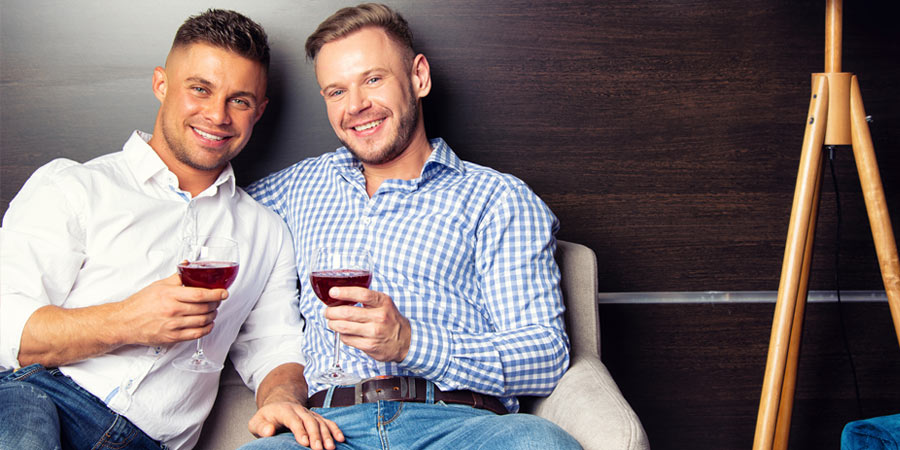Dating Men as a Man

Even after you’ve set up your online dating profile going on dates to meet men and see if you click enough to begin some sort of relationship can be a challenging experience. It can require lots of energy and often uncertainty.
When I first started dating, I had very little idea of what I was looking for, or how to go about finding it. I’ve learned that even if I’m not sure what I want, I usually know enough to give others an indication of the types of connections I’m open to, so they can decide whether we might be a good fit.
Dating stereotypes
There are lots of stereotypes around how dating and relationships should look. One of these is the relationship escalator which assumes relationships fit a specific formula: you meet, date, hook up, move in together, get a pet, get married, buy a house with a white picket fence, have kids and live happily ever after. Any deviation from this process indicates a “failed” relationship. Another stereotype is that there are fixed gender roles (particularly in heterosexual relationships). This includes things like women raising kids and doing domestic duties while men earn income. And of course some believe that same-sex attracted men only hook up and never form long-term relationships.
All of these stereotypes are incorrect and can be harmful. Your ideal relationships can look however you want it to. What’s important is being on the same page as your partner/s about what you’re looking for. You can follow the “relationship escalator” if you want, or deviate from it at any point. This could mean exploring non-monogamy or even polyamory, having short term casual relationships or focussing on hooking up.
Dealing with homophobia
Same-sex-attracted men may have to deal with homophobia from their families or those of potential partners, or from people who see them and their partner out in public. Unfortunately this is still a thing in today’s society. I remember a date I went on with a guy where he was uncomfortable with public displays of affection because we were in a public park and he was concerned about people seeing us and reacting poorly. Even if that wasn’t a big risk, it’s still something that affects some people. This is a discussion worth having with potential partners.
What are you looking for?
Following on from the conversation around stereotypes, I like to have a discussion with potential partners about what we each want out of a relationship, so we can manage the our own expectations and that of our partner/date. Some people want a long-term cohabiting partner. Others might just be looking for a friend to have casual sex with, or even just a one-time thing. There’s a whole spectrum of possibilities in between too, and all of them are valid, as long as they’re mutually agreed upon.
Platforms like Gay Match Maker can help with these discussions because many people put detailed descriptions of what they’re looking for on their profile. At a minimum, you can often rule out those who probably won’t be a match without even having to start a conversation with them. You can customise your match criteria to help filter out people who wouldn’t be a good fit for you.
Monogamy, or non-monogamy?
We queer folks are already breaking social norms by having same-sex relationships, and therefore probably throwing gender-based relationship stereotypes out the window. It makes sense that we are also more open to breaking other stereotypes too, such as monogamy. Many gay men are interested in open relationships, in which they have a committed partner, but also hook up with people outside that relationship.
Personally I tend to form polyamorous relationships, where I’m open to multiple committed relationships with different people, where we each may have different relationship dynamics. I currently have a committed partner who I cohabitate with, but also date at least one other person who I care deeply about, and I hook up with other people who I connect with when I get the chance too.
I am also a relationship anarchist, which to me, means that I carefully design my relationship with each partner to find what works for us, and if we decide it’s not working, we can renegotiate what the relationship looks like. The Relationship Anarchy Smörgåsbord is a great tool to facilitate this, and is discussed in an episode of the Multiamory podcast.
Dealing with rejection
Not all relationships are a good fit. Sometimes we just have mismatched needs or expectations, or sufficiently different personalities that we don’t get on well enough for a partnership to benefit us both. Either you or the other person may decide this is the case, and need to start a conversation to either transition the relationship to something different (eg. becoming friends rather than romantic partners), or rejecting each other completely and deciding not to keep seeing each other.
Both sides of this interaction can be hard. Nobody wants to be rejected, or the bearer of bad news that may hurt somebody else. On the flipside, I think all of us seek an authentic relationship where we can be honest with each other, so it is always worth having these conversations.
If you’re the one being rejected, remember this probably isn’t something wrong with you, but simply an incompatibility between you and this particular person. Reminding yourself of this can help soften the blow of the rejection. When this happens to me, I try to thank the other person for their honesty even though it can be a hard conversation for both of us.
If you’re the one initiating this conversation, it can help to reassure the person that this is just a mismatched relationship, rather than something wrong with them.
Conclusion
Building relationships can be hard work, especially when colouring outside the lines and not following a script like the relationship escalator. Once you put in the effort and accept the risk of any given relationship not working out, relationships can be super rewarding.
So what are you waiting for? Get out there and start matching!



Likes & Comments
No comments yet